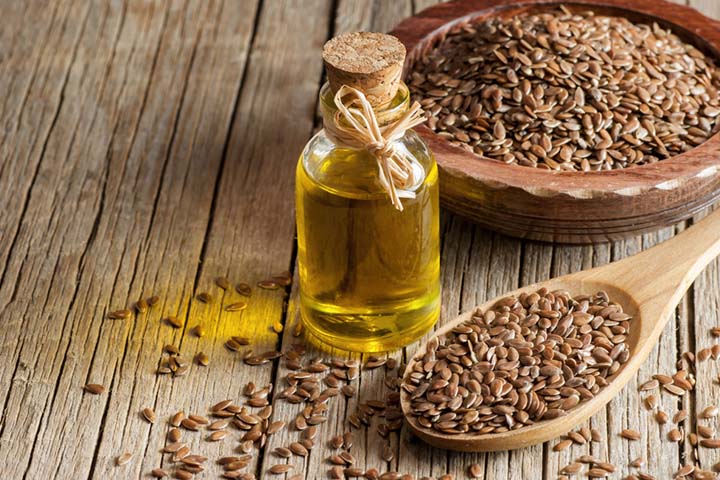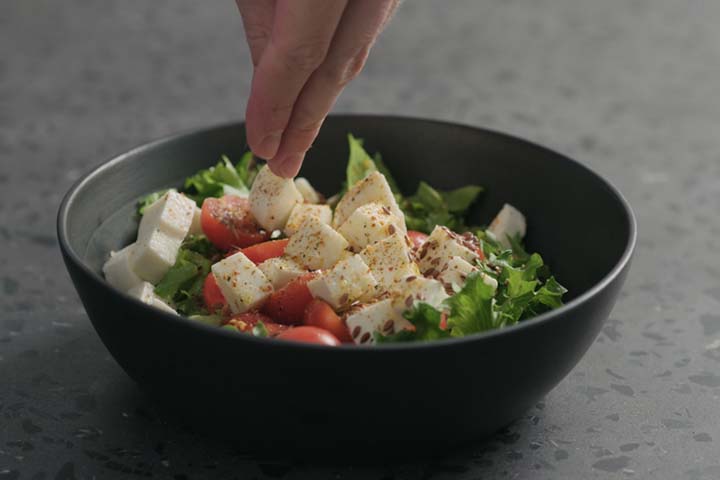When you’re breastfeeding, you should keep eating healthy. This is because the food you eat can alter the supply and composition of your breast milk and aid your recovery after birth.
It is considered healthy to consume flaxseed while breastfeeding. Flaxseed is also known as linseed and is high in omega-3 fatty acids, fiber, and bioactive plant components.
This post discusses the safety of flaxseed during breastfeeding, its health advantages, and ways to incorporate it into your diet.
Is Flaxseed Safe For Breastfeeding Mothers?
Consumption of flaxseed is well-tolerated in adults. Its safety and efficacy during lactation are not well researched (1), but it is considered safe to have them in small quantities. Consult a healthcare provider to know the amount of flaxseed you can consume. Medical consultation is important if you are considering dietary supplements or herbal supplements containing flaxseed oil.
Can Flaxseed Increase Breast Milk Supply?
There is an anecdotal belief that omega-3 fatty acids and phytoestrogensiXBioactive compounds found in plants that may either inhibit or carry out the functions of estrogen. found in flaxseed can increase breast milk supply. Although lactating mothers use flaxseed as lactogenic food, there is no clinical indication of its use to regulate (increase or decrease) breast milk production. However, their intake in moderate amounts, with a well-balanced diet, can provide some health benefits.
Possible Health Benefits Of Flaxseed When Breastfeeding
Here are some benefits of consuming flaxseeds.
- Supply of nutrients: One tablespoon (10g) of flaxseed seed provides 1.8g of protein. The seed also contains essential micronutrients, such as magnesium, calcium, potassium, phosphorus, zinc, copper, and selenium (2).
- Source of DHA and EPA: Flaxseeds contain ALA (alpha-linolenic acid), one of the essential polyunsaturated fatty acids, which our body converts into DHA (docosahexaenoic acid) and EPA (eicosapentaenoic acid). Nursing mothers and their breastfed infants need essential fatty acids to perform various body functions important for growth, development, and sustainment (3).
- Essential fiber: The non-absorbable fiber found in flaxseeds helps keep constipation away. The fiber acts as a prebiotic for gut bacteria, boosts intestinal health, and in the long run, helps in weight management, too (4).
- Antioxidant effects: Flaxseeds are a good source of secoisolariciresinol diglucoside (SDG) and lignans that have potential antioxidant effects (5). Antioxidants are essential to combat oxidative damage that occurs due to free radicals.
- Anti-inflammatory properties: Research shows that flaxseed products, such as flaxseed oil, have anti-inflammatory, antipyretic, and analgesic properties (6) (7). Its topical use as a poultice to relieve inflammation and soreness in conditions like osteoarthritisiXA form of arthritis that only impacts the joints causing inflammation and pain. is also documented (1) (8).
- Overall health benefits: Regular consumption of flaxseed with a well-balanced diet may help control blood sugar level, improve cholesterol levels, lower blood pressure, and improve heart health (9) (10) (11). Most of these flaxseed benefits are due to the presence of omega-3 fatty acids, insoluble fiber, and bioactive plant compounds, like lignans.
Besides these benefits, flaxseeds may help in treating health issues, such as bladder inflammation, vaginitis, and gastritis (12).
Precautions To Take While Consuming Flaxseed
Flaxseed should be consumed in moderation and with plenty of water as it could worsen constipation. Follow these precautions to avoid any possible side effects of the dietary intake of flaxseed (12).
- Flaxseed is not a common allergenic food, yet some allergic reactions to flaxseed and flaxseed oil have been documented. Check for possible reactions if you are planning to include it in any form for the first time.
- Avoid flaxseed if you have a gastrointestinal stricture or acute inflammation of the intestine, stomach, or stomach entrance.
- Avoid using flaxseed immediately after taking medicine, as it can delay the absorption time for certain medications.
- Breastfeeding mothers with any bleeding disorders or those on blood thinners should avoid flaxseed as it might slow blood clotting.
- Flaxseed contains phytic acid, an anti-nutrient that may reduce the absorption of micronutrients such as zinc and iron (13) (14). Therefore, excess intake of flaxseed must be avoided.
- Lactating mothers on medications for diabetes and blood pressure (high or low) should consult a doctor before starting the consumption of flaxseeds as they are known to have anti-diabetic and hypotensive effects.
- Avoid consuming partially defatted flaxseed meal as it might increase triglyceride levels in individuals suffering from high triglyceride levels.
- Those with a history of thyroid problems must consult a doctor before ingesting ground flaxseed, flaxseed oil, and supplements (15).
Ways To Include Flaxseed In Your Breastfeeding Diet
Once your doctor permits you to consume flaxseed, you can explore various flaxseed products. Flaxseed makes for a great egg replacement when baking. Follow the ratio of one tablespoon of flaxseed to three tablespoons of water for each egg you wish to replace.
- Flax milk is considered an alternative to animal milk as it is cholesterol and lactose-free. This unique property also makes it suitable for people allergic to soy, nuts, and gluten.
- Add roasted flaxseed in cereals, porridge, soups, smoothies, and shakes. It can be added to bread or pancakes, as well.
Autumn, a mom of one, shares how she includes flaxseed in her nursing diet. She notes, “All nuts and seeds are great for nursing because they offer great nutrients for you and your little one. Flaxseed is great because it has no flavor (at least, I don’t think so). I put it in smoothies, oatmeal, yogurt, and cereal (i).”
- Cold-pressed organic flaxseed oil is a great addition to salad dressings, dips, and sauces.
- Mothers can add these seeds to their lactation food recipes.
You can also prepare a customized seed and nut trail mix with flaxseeds. Do consult a lactation expert to know the safe intake amount of the various nuts used.
Most nursing mothers wonder if they may consume flaxseed while breastfeeding to boost their milk supply. However, there is no proper research backing this fact. Nevertheless, flaxseeds are rich in fiber and offer several health benefits to a breastfeeding mom. These seeds have an anti-inflammatory nature and are packed with vital nutrients. Hence, incorporating them into your regular, well-balanced diet can supplement your maternal nutrition and aid your infant’s health. However, you must speak to your doctor before including flaxseed in your nursing diet, especially if you are on supplements or other medications.
Key Pointers
- Though lactating mothers use flaxseeds to increase milk supply, its efficacy is not scientifically established.
- Flaxseeds contain calcium, magnesium, and zinc, among other required nutrients during breastfeeding.
- They should be consumed with caution by nursing mothers if they have stomach disorders and when taking other medications or dietary supplements.














